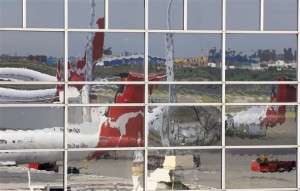
LOST GLOSS Idle Qantas planes are reflected in a window at Sydney Airport in Sydney on Sunday, Oct. 30, 2011. Qantas Airways grounded all of its aircraft around the world indefinitely Saturday due to ongoing strikes by its workers. AP Photo/Rick Rycroft
PERTH—Qantas’s shock decision to ground its fleet of planes is a calculated gamble that risks trashing not only the “Flying Kangaroo” brand but that of Australian tourism generally, experts say.
Chief executive Alan Joyce on Saturday dramatically escalated a months-long dispute with unions over pay and conditions, stranding some 70,000 travelers in airports around the globe and forcing government mediators to step in.
The move, from an airline that has carefully cultivated a reputation for reliability and safety over the past 90 years, stunned everyone, including the government, rival airlines and the unions involved in the dispute.
But the hardest hit were the traveling public, who angrily lined up at airport terminals from London to Bangkok to condemn Qantas for abandoning them with no prior notice through the abrupt cancellation of more than 400 flights.
Briton Debbi Zornes, stranded in Sydney, offered a typical reaction, telling AFP: “I will never book with Qantas again.”
Around Australia, front-page headlines screamed “DEBACLE” and “CHAOS” as the magnitude of the disruption, and its unfortunate timing, became apparent.
Shareholders are also bracing for the worst when the market opens on Monday. CommSec chief equities economist Craig James said many will reach for the “sell” button, sending the national carrier’s stock price even lower.
Joyce dropped his bombshell as Perth was in the international spotlight during a meeting of Commonwealth leaders and Victoria state was gearing up for the country’s biggest horse race, the Melbourne Cup.
The Adelaide Advertiser said in an editorial that the grounding was “a blow to national pride, a pain for affected passengers and a challenge for our industrial relations system.”
Air New Zealand’s Australasian general manager Bruce Parton said he was surprised at Joyce’s decision, because Qantas would have known the grounding would be a public relations disaster.
“It will do a lot of brand damage in Australia, they must have taken this into consideration,” he told TVNZ.
Compounding the airline’s image problem, the action came just a day after Joyce’s pay packet was more than doubled to Aus$5 million ($5.4 million) at a shareholder meeting where irate unionists berated him for cutting 1,000 jobs.
Gerard Henderson, head of conservative think tank The Sydney Institute, said Qantas had no choice but to face down unions whose rolling strikes had already tarnished the company’s reputation with customers.
“This dispute would have gone on and on, so it had to be resolved,” Henderson told ABC television.
“It’s terrible for travelers but it was going to be terrible anyway, because the airline would bleed to death.”
But tourism chiefs said Qantas’s status as Australia’s flag carrier and arguably its best known global brand meant the grounding had implications that went far beyond the company.
Tourism Accommodation Australia managing director Rodger Powell said the country’s “Brand Australia” was also in jeopardy, threatening a tourism industry worth Aus$34 billion a year.
“There’s undoubtedly immediate concern in terms of the impact of traveling customers, but I think the bigger concern is the longer-term impact on the Australian tourism brand, both overseas and at home,” he said.
Rival airlines have already moved to fill the void, promoting their own brands in the process as they help fuming passengers get home.
Virgin Australia has added 3,000 seats to its domestic capacity while Kuala Lumpur-based AirAsia X has “rescue fares” on its long-haul network.
Joyce acknowledged on Sunday that the grounding would hurt Qantas’s reputation but said, with the industrial action costing Aus$15 million a week, the airline’s very survival was at stake.
“The status quo would have been the death of Qantas,” he said.